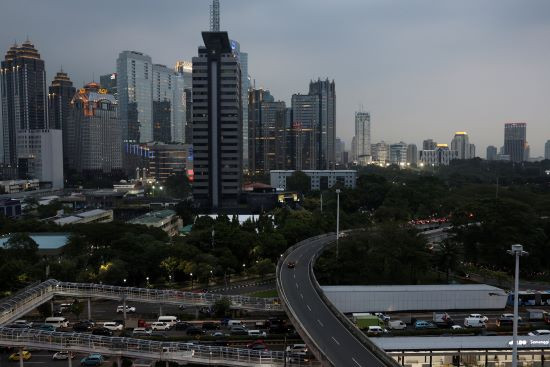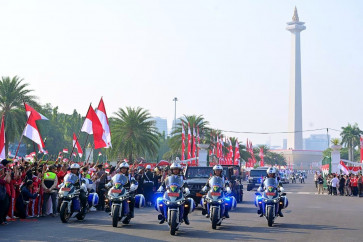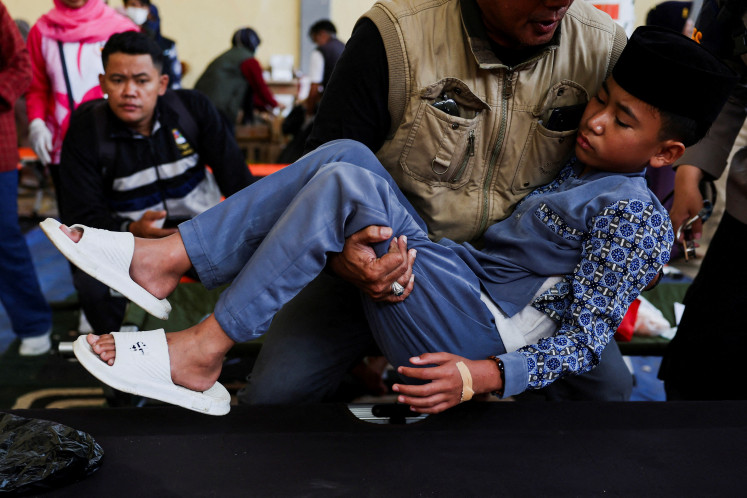Popular Reads
Top Results
Can't find what you're looking for?
View all search resultsPopular Reads
Top Results
Can't find what you're looking for?
View all search resultsSpending on the rise, savings strain: Indonesia's financial tightrope
Domestic economic pressures, driven by inflation and the rising cost of living, continue to weigh heavily on household sentiment. This has led to a shift in spending patterns, and understanding these changes is essential for businesses seeking sustainable growth.
Change text size
Gift Premium Articles
to Anyone
Indonesian spending is on the rise, largely driven by inflationary pressure impacting costs in a complex market landscape.
Domestic economic pressures, driven by inflation and the rising cost of living, continue to weigh heavily on household sentiment. This has led to a shift in spending patterns, and understanding these changes is essential for businesses seeking sustainable growth.
Research by Boston Consulting Group (BCG) found that 33 percent of Indonesian consumers expect to spend more, with 76 percent citing the rising prices of essentials as one of the main reasons. This is the second-highest rate recorded in Southeast Asia, after the Philippines.
The rising costs of nonessential items and weakening currency are also among the top three drivers of increased spending, cited by 47 percent and 43 percent of respondents, respectively.
Indonesian consumers expect to spend more in certain sectors, as reflected in a nearly fivefold rise in the number of consumers willing to spend compared with earlier periods, proving that the economy is undergoing a significant transformation.
Out of a total of 14 categories tested, mobile technologies, automotive products and leisure travel are the top three categories in which Indonesians are expecting spending to increase. To make room for these big-ticket items, consumers are cutting back on everyday indulgences like dining out, snacks, beverages, gaming and apparel. This demonstrates how consumers in Indonesia are prioritizing investments in products and services that give them a better quality of life.
The message is clear: Consumers are shifting spending categories and prioritizing experiential, big-ticket spending over every day functional needs. Brands and businesses must align their offerings to deliver emotional engagement to meet these evolving preferences.
Rising reliance on short-term financing
Among Southeast Asian countries, Indonesian consumers are least optimistic about savings.
BCG research found that 40 percent of consumers are saving less or not saving at all, the highest share in the region, while 56 percent foresee they would save less or will be unable to save at all.
Most Indonesian consumers save for financial security, retirement and their children’s education. However, there is now a growing reliance on short-term financing options like buy now, pay later (BNPL) schemes and payday loans.
In fact, over 40 percent of Indonesians have used BNPL services and payday loans as their primary financing methods. This suggests that a majority of consumers in Indonesia struggle to manage their daily finances, let alone achieve their financial aspirations.
Across the market, there is strong evidence of a rise in using BNPL and payday loans in Indonesia; a trend often associated with rising inflation and increased cost of living. BNPL grew at a 22 percent compound annual growth rate (CAGR) from 2021-2024, and is projected to grow at 10 percent CAGR from 2025 to 2030.
There is clear demand for financing tools that enable increased cashflow, flexibility and low-barrier payment options among Indonesians to manage necessary expenses.
Indonesians now prioritize sustainability and personalized services
Many Indonesians are choosing to prioritize essential spending and experiences even if that means dipping into their savings or turning to alternative financing solutions. One sector that stands out is the automotive industry.
Sixty-five percent of Indonesians who have recently purchased or leased vehicles opted for a two-wheeler, while 47 percent have purchased a car. Interestingly, 48 percent of consumers indicated that they were willing to pay more for higher quality vehicles with sustainable fuel options.
Indonesian consumers are shifting their priorities and are paying more attention to details like fuel efficiency or battery range. This indicates a growing awareness of environmental concerns and cost efficiency.
Looking forward, 43 percent of Indonesians foresee that their spending on automobiles will increase, primarily driven by sustainable choices and higher-quality vehicles. Interest in electric vehicles (EVs) is also on the rise, with 17 percent of consumers owning an EV and nearly half (47 percent) indicating they are likely to purchase one in the near future.
Therefore, businesses should start prioritizing these features to appeal to Indonesian consumers in the coming years.
Apart from the increase in environmental concerns when making purchases, Indonesians also expect personalized services that enhance their shopping experiences. Research by BCG found that 47 percent of Indonesian consumers want businesses to help them find the best prices, while half of them agree that personalization improves their overall experience.
Given the rise in inflation that has resulted in more selective spending, businesses must strive to deliver a tailored experience for each customer. This will strengthen brand loyalty and hopefully improve customer satisfaction, driving them to spend more when the opportunity arises.
Digital adoption and expansion in sharia financial services
Part of creating a personalized customer experience is offering multiple payment options that are seamless and efficient, such as digital banking.
Mobile and internet banking are now the preferred payment options for everyday financial transactions. Among sharia banking customers specifically, 86 percent rely on digital channels for daily banking needs.
This shift is driven by younger and higher-income consumers who have embraced mobile-first transactions due to speed and convenience. Meanwhile, mass and middle-income consumers still rely on bank branches for resolving complex issues.
By offering products and services, such as haj and umrah savings, gold savings and religion-compliant personal financing, banks receive strong recommendations from community networks. This plays an important role in influencing consumer behavior, as most consumers prefer businesses that have good customer service and support.
Other opportunities for growth in Indonesia include halal small and medium enterprises (SMEs), which now account for 55 percent of the country’s SME sector. These businesses offer comprehensive financial solutions, like QR-based payment systems and accessible halal-compliant financing.
Regional expansion presents another avenue for growth, particularly in areas like Aceh, East Kalimantan and West Sumatra. These areas have large Muslim populations, but relatively low shariah banking penetration. Expanding into these underserved regions could offer banks a competitive advantage, especially when combined with localized digital outreach strategies.
Time for businesses to reassess their strategies
What does this mean for businesses? First, Indonesians expect an increase in spending due to inflationary pressure from rising costs of essentials, coupled with the weakening currency. However, there is resilience in selected categories like mobile technology, automotive products and leisure travel, showing that Indonesians are moving toward experiential categories over every day functional categories. Businesses should pivot toward value-rich, experiential offerings that deliver emotional engagement and long-term benefits.
Furthermore, given that the rising cost of living is putting a strain on savings, there is growing demand for short-term financing tools that will allow consumers to increase cashflow, alongside flexible and low-barrier payment options. Business and financial institutions can address this by providing suitable offerings and potentially capture these value-conscious consumers.
In the automotive industry, improving fuel and power efficiency in vehicles, as well as preparing for EV readiness in mobility, will help to meet evolving consumer expectations.
Finally, financial institutions looking to expand their shariah sector should think about combining seamless digital banking experiences with community-driven trust, tailored faith-based offerings and consider targeted expansion into underserved Muslim-majority regions.
Boston Consulting Group (BCG) is a global consulting firm that works closely with business and societal leaders to drive transformative change. This year marks BCG’s 30th anniversary of creating a lasting impact in Indonesia.
***
Tushar Agarwal is managing director and partner, Boston Consulting Group (BCG) and Lilian Cheong is manager of Center for Customer Insight (CCI) for Southeast Asia, BCG Vantage.
The article is written with special thanks to: Prashant Choudhary, managing director and partner, Boston Consulting Group (BCG).










